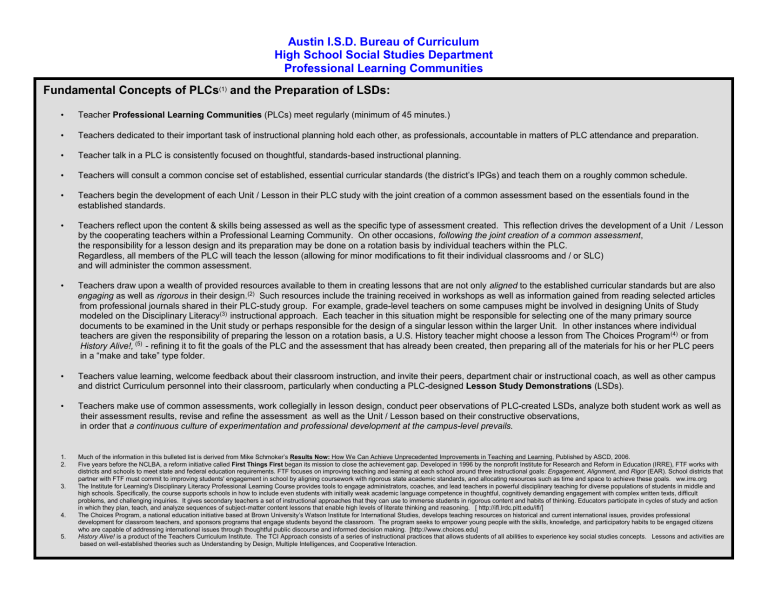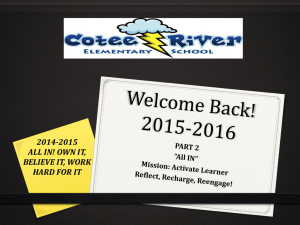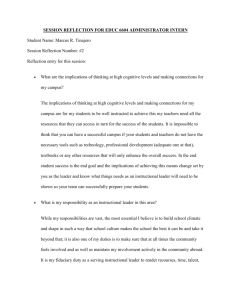Social Studies Campus PLC Profile and LSD Guidelines

Austin I.S.D. Bureau of Curriculum
High School Social Studies Department
Professional Learning Communities
2008
– 09 Campus Profile
Fundamental Concepts of PLCs
(1)
and the Preparation of LSDs:
• Teacher Professional Learning Communities (PLCs) meet regularly (minimum of 45 minutes.)
•
Teachers dedicated to their important task of instructional planning hold each other, as professionals, accountable in matters of PLC attendance and preparation.
• Teacher talk in a PLC is consistently focused on thoughtful, standards-based instructional planning.
•
Teachers will consult a common concise set of established, essential curricular standards (the d istrict’s IPGs) and teach them on a roughly common schedule.
•
Teachers begin the development of each Unit / Lesson in their PLC study with the joint creation of a common assessment based on the essentials found in the established standards.
• Teachers reflect upon the content & skills being assessed as well as the specific type of assessment created. This reflection drives the development of a Unit / Lesson by the cooperating teachers within a Professional Learning Community. On other occasions
Regardless, all members of the PLC will teach the lesson (allowing for minor modifications to fit their individual classrooms and / or SLC) and will administer the common assessment.
, following the joint creation of a common assessment the responsibility for a lesson design and its preparation may be done on a rotation basis by individual teachers within the PLC.
,
• Teachers draw upon a wealth of provided resources available to them in creating lessons that are not only engaging as well as rigorous in their design.
(2) aligned to the established curricular standards but are also
Such resources include the training received in workshops as well as information gained from reading selected articles
from professional journals shared in their PLC-study group. For example, grade-level teachers on some campuses might be involved in designing Units of Study
modeled on the Disciplinary Literacy (3) instructional approach. Each teacher in this situation might be responsible for selecting one of the many primary source
documents to be examined in the Unit study or perhaps responsible for the design of a singular lesson within the larger Unit. In other instances where individual
teachers are given the responsibility of preparing the lesson on a rotation basis, a U.S. History teacher might choose a lesson from The Choices Program (4) or from
History Alive!, (5) - refining it to fit the goals of the PLC and the assessment that has already been created, then preparing all of the materials for his or her PLC peers in a “make and take” type folder.
• Teachers value learning, welcome feedback about their classroom instruction, and invite their peers, department chair or instructional coach, as well as other campus and district Curriculum personnel into their classroom, particularly when conducting a PLC-designed Lesson Study Demonstrations (LSDs).
•
Teachers make use of common assessments, work collegially in lesson design, conduct peer observations of PLC-created LSDs, analyze both student work as well as
their assessment results, revise and refine the assessment as well as the Unit / Lesson based on their constructive observations,
in order that a continuous culture of experimentation and professional development at the campus-level prevails.
1.
2.
3.
4.
5.
Much of the information in this bulleted list is derived from Mike Schmoker’s Results Now: How We Can Achieve Unprecedented Improvements in Teaching and Learning, Published by ASCD, 2006.
Five years before the NCLBA, a reform initiative called First Things First began its mission to close the achievement gap. Developed in 1996 by the nonprofit Institute for Research and Reform in Education (IRRE), FTF works with districts and schools to meet state and federal education requirements. FTF focuses on improving teaching and learning at each school around three instructional goals: Engagement, Alignment , and Rigor (EAR). School districts that partner with FTF must commit to improving students' engagement in school by aligning coursework with rigorous state academic standards, and allocating resources such as time and space to achieve these goals. ww.irre.org
The Institute for Learning's Disciplinary Literacy Professional Learning Course provides tools to engage administrators, coaches, and lead teachers in powerful disciplinary teaching for diverse populations of students in middle and high schools. Specifically, the course supports schools in how to include even students with initially weak academic language competence in thoughtful, cognitively demanding engagement with complex written texts, difficult problems, and challenging inquiries. It gives secondary teachers a set of instructional approaches that they can use to immerse students in rigorous content and habits of thinking. Educators participate in cycles of study and action in which they plan, teach, and analyze sequences of subject-matter content lessons that enable high levels of literate thinking and reasoning. [ http://ifl.lrdc.pitt.edu/ifl/]
The Choices Program, a national education initiative based at Brown University’s Watson Institute for International Studies, develops teaching resources on historical and current international issues, provides professional development for classroom teachers, and sponsors programs that engage students beyond the classroom. The program seeks to empower young people with the skills, knowledge, and participatory habits to be engaged citizens who are capable of addressing international issues through thoughtful public discourse and informed decision making. [http://www.choices.edu]
History Alive!
is a product of the Teachers Curriculum Institute. The TCI Approach consists of a series of instructional practices that allows students of all abilities to experience key social studies concepts. Lessons and activities are
based on well-established theories such as Understanding by Design, Multiple Intelligences, and Cooperative Interaction.
Austin I.S.D. Bureau of Curriculum
High School Social Studies Department
Professional Learning Communities
2008
– 09 Campus Profile
_______________________________________________________
CAMPUS
Department Chairs,
Please submit your department’s PLC profile by
September 30,2008.
Leadership
Please provide the names of those in your department who have been assigned the leadership roles identified below:
___________________________________________________________________________________________________________
DEPARTMENT CHAIR / INSTRUCTIONAL COACH
Please provide the names of those in your department who have been assigned the leadership roles identified below:
____________________________________________________________________________
World Geography Lead Teacher
____________________________________________________________________________
World History Lead Teacher
____________________________________________________________________________
U.S. History Lead Teacher
___________________________________________________________________________
Economics Lead Teacher
___________________________________________________________________________
Government Lead Teacher
Preliminary Planning
Professional educators responsible for the teaching of Social Studies on your campus should expect to participate in weekly planning meetings held at a regular time and place.
At least one of these four required monthly meetings is to be the Department’s administrative meeting followed by the consecutive meetings of grade-level PLCs whose primary work focuses on the developing and implementing of Lesson Study Demonstrations (LSDs).
While unforeseen circumstances may require rescheduling, to the best of your ability and following a planning session with your Lead Teachers, provide the following information.
Our Campus Social Studies team will meet regularly on ______________________________ at ______________ a.m. / p.m. in _________________________________________________.
A
Austin I.S.D. Bureau of Curriculum
High School Social Studies Department
Professional Learning Communities
2008
– 09 Campus Profile
Teacher Assignments
Please provide the following information for all teachers of Social Studies content on your campus. Teachers assigned more than one prep. should naturally find themselves working in the grade-level PLC that is their primary focus or for which they have been assigned multiple sections to teach. However, the primary concern of the chair will be a wellbalanced distribution of the department’s teachers that would facilitate the creation of effective PLCs for each content area.
TEACHER NAME
Total # of
Preps.
Grade-Level
Professional Learning Community SLC / Academy (if applicable)
Austin I.S.D. Bureau of Curriculum
High School Social Studies Department
Professional Learning Communities
2008
– 09 Campus Profile



